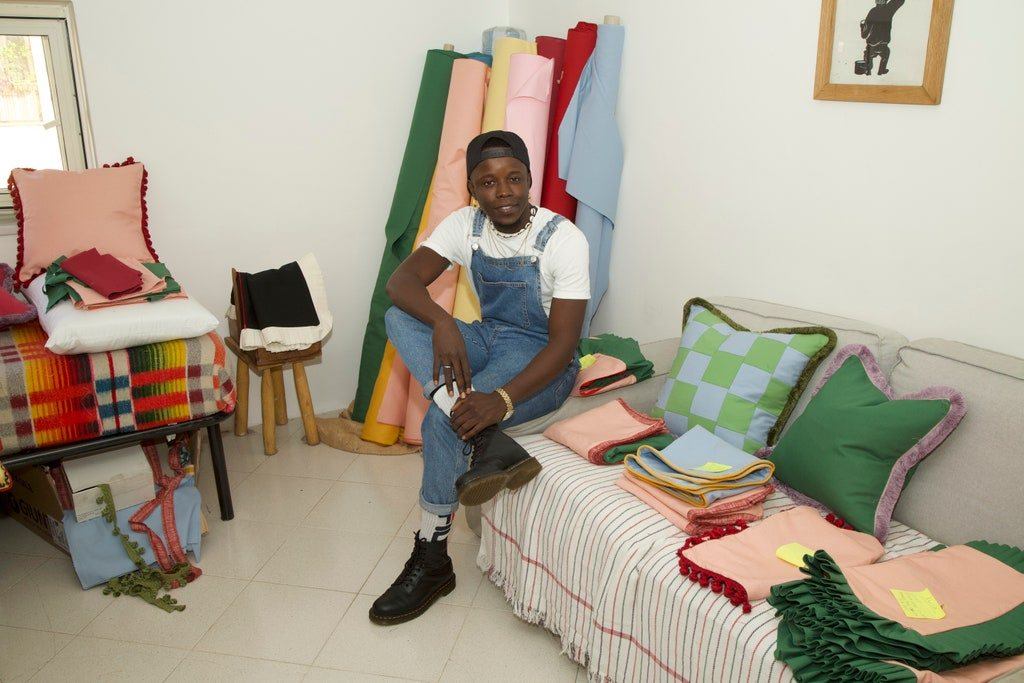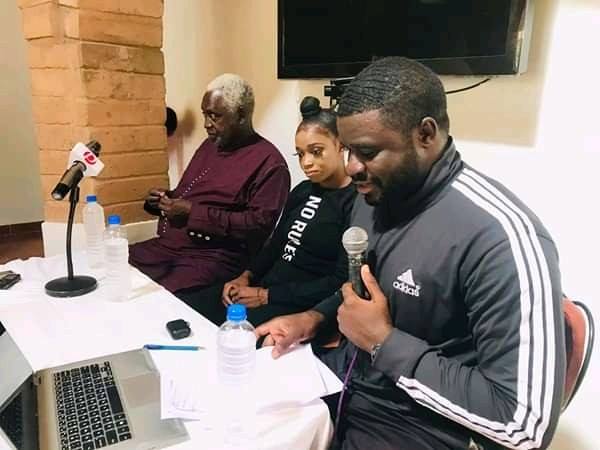By: CARMEN ROSY HALL
Paboy Bojang was 13 years old when he began working at his uncle’s tailoring shop in the Gambia, where he learned to sew. After his uncle migrated to Europe, leaving Bojang to maintain the shop, Bojang had no choice but to take on the role as principal breadwinner as school was not an option.
He developed a unique eye for choosing fabrics and colors which has, this year, become the backbone of his home goods company. Bojang’s Naples-based line of cotton cushions, In Casa by Paboy, has quickly gained recognition for its buoyant pleated edges, bold color combinations and signature red zippers.
“When I was small, the women in my village wore bright colored scarves and dresses for special occasions, and for going to the mosque,” Bojang, 28, says of the inspiration for his designs. “In Naples, I am inspired by all the old buildings that are painted dark reds and yellows, the street life and multicultural markets. I also love Pompei and the frescoes and floor mosaics, and spotting the color combinations the ancient people used to use in their decorations. The pinks and wine reds.”
In Casa by Paboy’s confectionery decor has been celebrated by customers worldwide, gaining fans like Blanca Miro and Luke Edward Hall who have adorned their homes with cushions that double as ripples of joy in a difficult year. Bojang hopes the cushions will continue to provide happiness for his buyers, though his greater vision is to continue to help other migrants, encouraging them to leverage their skills and create opportunity by utilizing technology. Bojang’s store was created on Instagram, and this week he launched his first formal website offering a capsule collection and custom orders.
Bojang’s tumultuous experience getting from the Gambia to Italy informs the brand’s mission to spread awareness. “I left the Gambia due to the dictatorship,” he explains. “I didn’t see any future in the Gambia where our life was so hard, so thought that I should take the opportunity to leave, which so many other young men were doing.” After crossing the desert, Bojang attempted to cross the Mediterranean sea in a rubber dinghy three times before he was finally rescued and brought to Libya, where he says he was then kidnapped and imprisoned by armed militia. “I had no idea how dangerous the journey would be,” he adds.
After a year spent sleeping in the doorways of Tripoli, he was eventually sent to a refugee reception center on the outskirts of Naples, where hundreds of migrants were crammed into an out of business wedding venue filled with camp beds. Eventually, the camp closed, and Bojang was moved to a different space in the center of Naples, where he was able to explore a new city and find solace in nightlife and the busy squares of the old town, filled with young people spilling out of cafes and markets with foods and fabrics that reminded him of home.
In 2017, Bojang was granted humanitarian protection in Italy, allowing him a permit to work a job making tiles and vases in a historic Majolica tile workshop. “The workshop was filled with colored 300-year-old tiles, paints and prints of designs which gave me lots of ideas for my cushion covers,” he remembers.
Every two years, permits for asylum seekers in Italy have to be renewed, and when his permit was due, the slow bureaucracy left him in limbo. While he was issued a receipt that allowed him to legally stay in Italy, it was impossible to receive a valid work contract. Bojang was left without a job, but friends he had made in Naples helped him pave a new path.
One spring evening in 2016, outside an Afrobeat club called Teranga in the Piazza Bellini, he had met Sophia Seymour. Seymour, a British journalist living in Naples, offered him a room in her house following the loss of his job. While they lived together, Bojang used Seymour’s sewing machine and the remnants of some old fabrics to create his first cushion covers. Local fabric shops, struggling to keep their doors open, cut him deals on their offcuts and excess fabrics.
Now exclusively sourcing 100% cotton fabrics from the same neighborhood, Bojang intends to employ other migrants living in Naples as his business grows. While he and Seymour may no longer be able to go clubbing amid the pandemic, Bojang sews while listening to music that keeps him energized. “I also love sitting by the sea and looking out at the bay of Naples, at the different blue colors of the sky that changes color all the time, and the volcano,” Bojang says. “Everything I experience in my life comes into my work; that is what influences my choices.”
In Casa by Paboy cushions are sold online via his Instagram account @in_casa_by_paboy and his website. Source – Vogue. com




